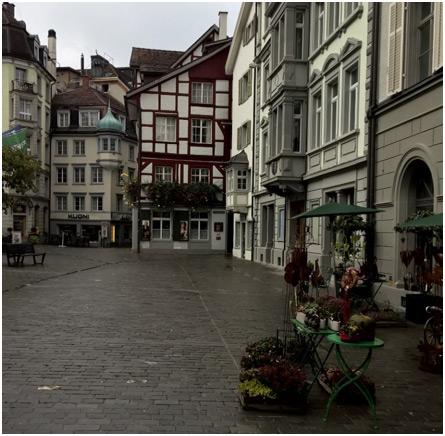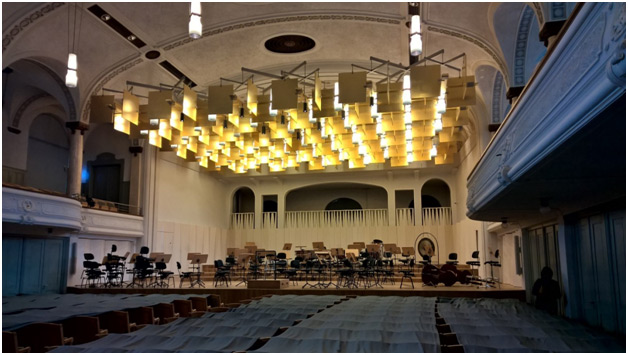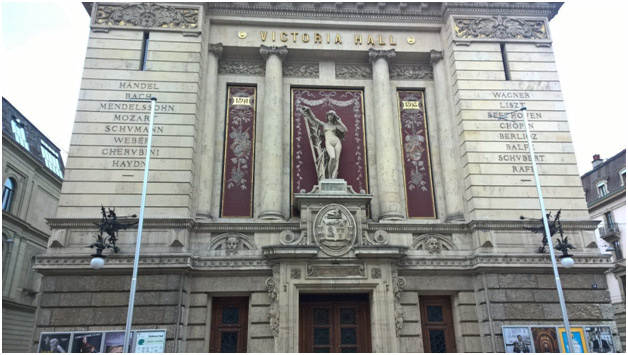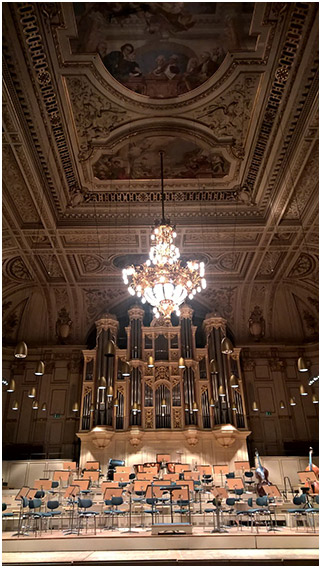International travel is a great privilege when there is time to take stock of one’s environment. If one is lucky enough to travel between disparate places in a short space of time – the observations can be stark and revelatory. This month which started in Mumbai let to a short tour with the orchestra to Abu Dhabi, a couple of days in Dubai, four days in Switzerland and then back to Los Angeles.
It was not my intention to write a travelogue this month, but some extraordinarily memorable moments have made it impossible not to recount them. Our orchestral concerts in Abu Dhabi and Al-Ain were successfully received. Our hosts in Abu Dhabi are doing things the right way, with concern for a stable, deep-rooted cultural offering, which involves education and promise for the future for young Emiratis. I was gratified to meet with Shaikh Nahyan bin Mubarak al Nahyan, who was present at our concert and greeted us warmly. The Nahyan family have ruled the area since 1791 with the oasis tribal stronghold of Al-Ain shifting its seat of power to Abu Dhabi. There is something exciting at work in Abu Dhabi. The Louvre and the Guggenheim have opened satellite premises and there is a palpable international presence from the USA, Russia, China and Europe beyond just their diplomatic missions.
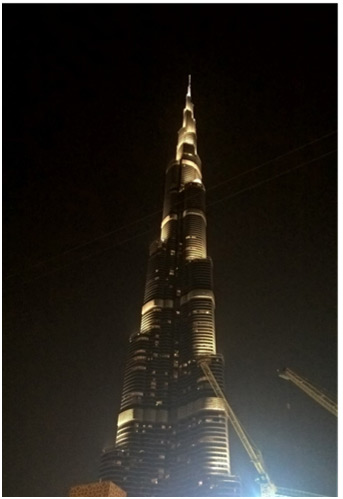 Burj Khalifa – the world’s tallest building.
Burj Khalifa – the world’s tallest building.
The construction at the base is the new opera house.
Dubai, on the other hand, is coming to a reckoning point as the proverbial playground of the middle-east. The tourism, resort traffic and a swanky hotel business has made this port and trading city an unlikely destination in the most unlikely of places, but nevertheless they are building a brand new opera house that opens in 2017, at the foot of the famous Burj Khalifa tower. Its location along with the musical fountains and luxury shopping speaks of glitz over substance. Not to be out done, Abu Dhabi also plans a fine acoustic concert hall to open by 2018 – and if one looks at the plans set out by Al-Nahyan governance, I suspect that Abu Dhabi will play New York to Dubai’s Las Vegas within the next 15 years. It will be a fascinating area to watch as it develops.
The last time I was in Switzerland I was journeying between Besançon and Lugano in 1990 for international conducting competitions in each location, with a short interview on radio Basel. Lugano was idyllic then, as is almost any lakeside location in Switzerland. I remember that I had enjoyed the extraordinary culinary experiences of the Franche-Comte region around Besançon for about three weeks, and spent about the same amount of money on the three days spent in Lugano. It is still less expensive to eat and shop across the border. In short, if you mistakenly stay on a train one hour too long in Switzerland you might end up in France or Italy and be able to enjoy the error in great food, wine and hotels, without having to adjust your financial portfolio. The time before that, was a year previous in 1989 when I was journeying between Florence and Bayreuth, using Switzerland as a conduit by train. The mountain passes provide some of the best scenery in the world, and the train service is still perfectly punctual.
This trip, I managed to spend time in Zürich, Geneva, St. Gallen and Bern, – four cities to which I had not travelled in the past, three of which we will visit with the Symphony Orchestra of India on tour in January next year. 25 years later, there is a sense of things that haven’t changed. If there is one remarkable feature of Switzerland, it’s the timeless nature of its landscapes and cities. Untouched by war and the destruction that it brings the cities of Geneva, St. Gallen and Bern stand like large jewels in an unworn crown. Time stands still, and local customs make it more apparent that things in Switzerland operate in their own way. We arrived in St. Gallen, by chance on the 16th October, the feast day of St. Gallus. The monk Gallus, in his hermetic existence was sitting at a fire in the woods and charged by a wild, ferocious bear. He ordered the beast to stop. The bear slunk off to collect firewood and rejoined Gallus peacefully to enjoy the warmth of the fire. Such tales, so similar to the Bavarian myths and legends of the Black Forest a short distance to the north, reminded of the shared heritage of German Swiss their fabled folklore so prevalent in the German opera tradition of Weber, Humperdinck and Wagner and their strongly held catholic connections with a mystical church. The whole town seemed to be deserted, and once we’d stumbled onto the great cathedral, we knew why. The orchestra and choir played and High Mass was in full swing, secured by liveried Swiss Guard. My picture only captures some of the magic.
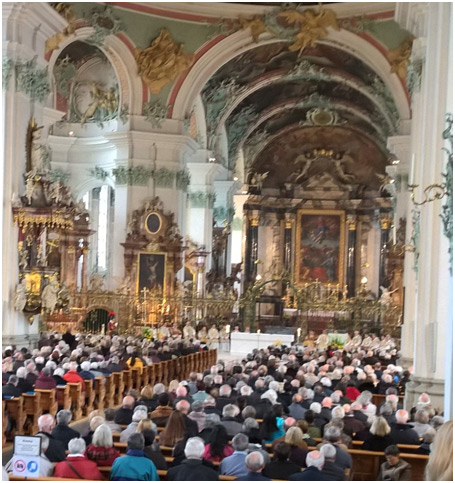 The Cathedral– on the feast day of St. Gallen
The Cathedral– on the feast day of St. Gallen
This quaint, and completely untouched city shines at every corner, drawing your eyes to marvelous buildings that reflect not only civic and ecclesiastical strength but also local village life. What a great place to visit with an orchestra from India. It’s this multi-dimensional exchange that is most enriching.
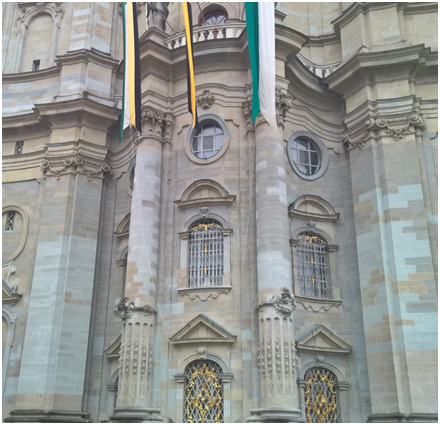 St. Gallen Cathedral – exterior
St. Gallen Cathedral – exterior
Prior to this we had visited the Tonhalle in St. Gallen, where we will perform on January 22nd. Their small but fine orchestra and their prideful ownership of the composer Othmar Schoeck is precisely the same sentiment that provides for a vibrant audience and unfettered concert going as envisaged by its founder Kirchhofer when the hall was built in 1906. A reworking of acoustics and modern amenities in 1993 has made it a great concert venue. We are in excellent company. Arthur Nikisch performed here with the Leipzig Gewandhaus, Richard Strauss with the Munich Court Orchestra, Felix Weingartner with the Vienna Philharmonic and Toscanini with the Orchestra of La Scala. We look forward to performing not only at this concert hall, but for this extraordinarily vibrant community – who insisted on creating their own artistic traditions.
Geneva also represents this extraordinary timeless nature, but bustles with a business edge that is similar to Zurich. Victoria Hall, another one of our concert venues in January, represents in character and in stature the bejeweled quality of Switzerland that is ever present. It is clear that there is a Swiss way of doing things and one isn’t allowed to contemplate changing it. After a while, one is forced to accept that it is better this way. I very much look forward to performing Bartók in this wonderful hall that stands on Place Béla Bartók – the home of the legendary Orchestre de la Suisse Romande. As my colleagues will remember – our ears still ring with those marvelous recordings with legendary maestro Ernst Ansermet. I’m certain that this atmosphere informed his music making and may have contributed to its very special qualities. It is a moment of continuity that maestro Charles Dutoit – whose early days were guided by Ansermet, performs regularly in Geneva. Maestro Dutoit spoke to me of some wonderful connective conversation between Ansermet and the composer Claude Debussy. Ansermet had gone to Debussy with some suggestions on– Sirènes, from Les Trois Nocturnes. Debussy had agreed to amend the original score, and this fascinating, edit worthy information has still not found its way into today’s performances.
I noticed that the composers names etched into the walls did not have as great a representation from neighbouring Italy or from France as one might have expected – just one a piece. Though I don’t disagree with honouring those present (even Balfe with his one hit opera) I thought that Brahms might have been included without objection.
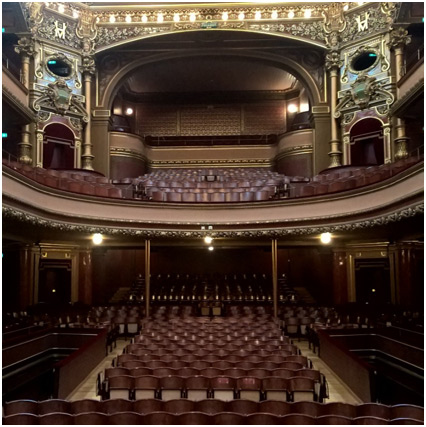 Victorial Hall – Geneva – Interior
Victorial Hall – Geneva – Interior
Zürich is perhaps the power broker in all these cities. The World Economic Forum will be held in January next year whilst we are there – and there is an international business environment that is unmistakably unique to Zürich. Anyone who has walked the length of Bahnhofstrasse will realize that this luxury shopping destination takes the wind out of Bond Street, Rodeo Drive and other similar world destinations combined. I contented myself with chocolate shopping at Sprüngli, which if any amongst you have not done, I highly recommend. Preservative free, freshly made daily chocolate truffles are a good reason to move to Zürich, but perhaps not the only one.
The Tonhalle in Zürich is a famous hall, a famous acoustic and home to one of the finest European orchestras the Tonhalle Orchester Zürich. We start our tour in this hall on January 19th. One of the great challenges of a visiting orchestra will be to play with the transparency of sound that is not only possible, but expected by the local audience. The acoustic is warm and rich, allowing for an envelopment of sound. I very much look forward to realizing the Bartok Concerto here, and also giving the European Premiere of the Hussain Tabla Concerto.
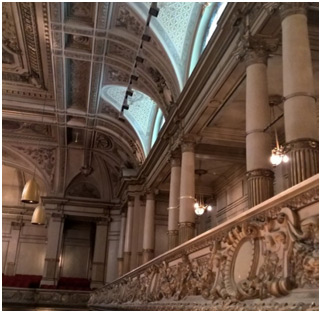 Tonhalle Zürich – from the stage
Tonhalle Zürich – from the stage
Switzerland’s capital city Bern is a mix of all the others. Clearly a civic hub with a business edge like Zürich, it has the historic impact of Geneva and the medieval charm of St. Gallen. Whether it’s the demarcation of the old city with those monolithic towers, the oldest clock in the world, the Einstein House, the Cathedral or the Bundeshaus, there is something remarkably picturesque about the Swiss capital. The view of the city from across the river as you travel towards Muri with the Bundeshaus and the Cathedral taking their imposing positions remind me of the ancient city of Durham, a show of power from across the river to the surrounding community – and any opposing army.
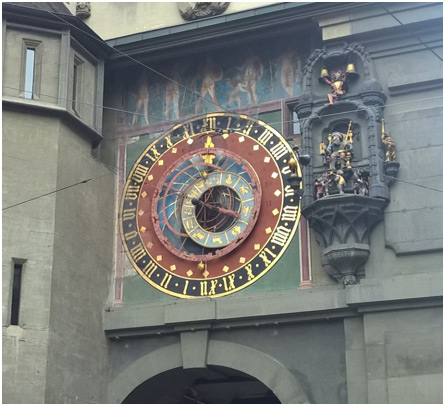 World’s oldest public working clock – Bern Switzerland
World’s oldest public working clock – Bern Switzerland
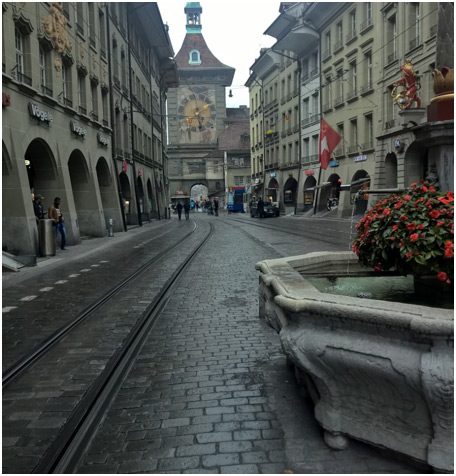 Bern – City Street in the Old Quarter
Bern – City Street in the Old Quarter
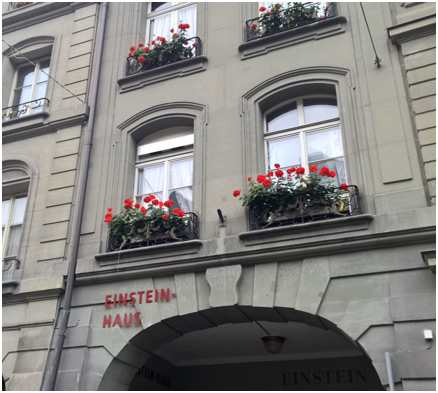 Einstein House- Kramgasse No. 49
Einstein House- Kramgasse No. 49
This location in Bern was rented by Albert Einstein between 1903 and 1905- and where he published the Theory of Relativity along with five other ground breaking papers. 1905 is known as his “annus mirabilis” starting an unparalleled creative period for him and subsequently an indispensable growth of knowledge for the world community of physicists. Whether Sibelius at Ainola, or Ansermet at Victoria Hall, or Einstein at Kramgasse No. 49 –location and lodgings can make a difference to the individual creative process.
Perhaps the most lasting impression of this October’s journeying has been the contrast. The pulsing energy and ordered chaos of the thronging multitudes in Mumbai. The new, ever-changing, haphazard, unproven, power-seizing, rapid growth of the cities of Arabia and the old, unchanging, ordered, proven, power-exuding, stability of these Swiss cities.
Many thanks!!








